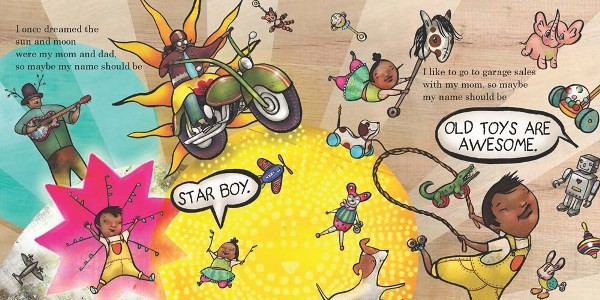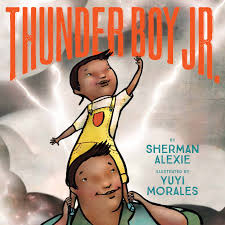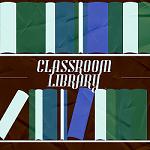Thunder Boy Jr.
Author: Sherman Alexie; Illustrator: Yuyi Morales
Published: May 10, 2016 by Little, Brown Books for Young Readers
Goodreads Summary: Thunder Boy Jr. is named after his dad, but he wants a name that’s all his own. Just because people call his dad Big Thunder doesn’t mean he wants to be Little Thunder. He wants a name that celebrates something cool he’s done, like Touch the Clouds, Not Afraid of Ten Thousand Teeth, or Full of Wonder.
But just when Thunder Boy Jr. thinks all hope is lost, he and his dad pick the perfect name…a name that is sure to light up the sky.
National Book Award-winner Sherman Alexie’s lyrical text and Caldecott Honor-winner Yuyi Morales’s striking and beautiful illustrations celebrate the special relationship between father and son.
My Review and Teachers’ Tools for Navigation: I should start by admitting that I have a mildly unhealthy obsession with Sherman Alexie’s work. Ever since I discovered his greatness in college, I can’t get enough of him! So I broke one of my rules and pre-ordered this book. It surely didn’t disappoint! His writing and Yuyi Morales’ illustrations makes for a masterful text. As you can see from the flagged passage (a spread) below, the writing and illustrations pop, and readers will be captivated by the text. My two-year-old son loved reading it with me.
One of the critiques I’ve read about this book is that it should come with a teacher’s guide for Native American naming traditions. I fully understand this critique can understand where it is coming from. While I think an author’s note would have been helpful, as a fellow Native American, I wonder if this really should be a critique of the text. Why must Sherman Alexie (and other Native Americans) feel the need to always justify and explain their stories? I imagine that Alexie would cringe at a teacher’s (well-intentioned) attempt to follow up a reading of this text with their own naming ceremonies/activities. That said, I don’t believe this is necessarily his job. A little bit of background research will surely produce a wealth of materials about the sacredness of these rituals. I believe it seems to normalize Whiteness when we constantly request authors of color to provide teaching materials for texts. Like others, while I’d love for some aspect of the paratext to include this extra material, I don’t believe that this is a flaw of the text.
Discussion Questions: Why does Thunder Boy Jr. want a different name from his father? How does the author build the story in order to share more about Thunder Boy Jr.’s feelings?; What qualities do you share with other family members? How are you different from your family members? Do we all feel a yearning to be unique or different? In what ways are you unique?
Flagged Passage:

Read This If You Loved: The Absolutely True Diary of a Part-Time Indian by Sherman Alexie, Crossing Bok Chitto by Tim Tingle, Jingle Dancer by Cynthia Leitich Smith, My Abuelita by Tony Jonston (Illustrated by Yuyi Morales), The Lone Ranger and Tonto Fistfight in Heaven by Sherman Alexie
Recommended For:




I loved this book on so many levels. Not only is it a wonderful and different kind of father/son story, I loved how the son wants his own name/identity but not for any negative reasons. It’s clear he still loves his dad.
I don’t know Native American naming traditions and had not problem understanding what was said about names in the book and was able to cull what I needed to know.
Love your thoughts on this book.
Alex, great to hear your thoughts about this one! I only know the naming traditions of a few tribes (Alexie’s not included), and I found the book to be comprehensible, too. I do agree with others that the book could be misconstrued by a well-meaning reader/teacher, but I think careful attention to culture would hopefully prevent this.
Interesting thoughts! I haven’t read this yet, but I’m on the wait list at the library! I think a lot of kids will be able to relate to the idea of wanting to discover and claim their own identity while still making their parents proud.
I completely agree, Jane! There are many applications of this book, and I am very excited about this!
I love this book, too! Thanks for sharing your thoughts on it. Love that you included discussion questions, too. #diversekidlit
Thanks for stopping by, Svenja!
I saw your comment at Gathering Books so am so glad you have shared your review with the #diverse kidlit linkup. I think the whole question of author’s notes is complex – I can certainly see where you are coming from – but I also think that all it often takes is a very short contextualisation – a couple of sentences… Certainly, as you say, exploting this kind of joyous book for teaching material would just kill it. Anyway,I haven’t seen this book yet, but like you I am a big fan of both Sherman Alexie and Yuyi Morales so I will be looking out for it!
Hi! I agree with you! I think what bothers me most is when people use it as a critique. Why must Alexie contextualize his life experiences when White authors aren’t critiqued in parallel ways? It is certainly a complex argument, but I like the amount of discussion that has come from this! I’d love for there to be a quick note in the book, but I don’t like the way others have approached it.
Great perspective! I recently wrote a blog post about this book too. I don’t necessarily think author’s notes in (some) books should be restricted to Native American or other diverse books. I personally think a note or just a few sentences should be included if the subject matter of the book contains different cultural traditions that many people may not be familiar with. That applies to all books whether they be written by White, Black, or Brown authors. I also see the point of letting books speak for themselves and let readers interpret it the way they want or do their own research if necessary.
I agree with you! I think the notes would certainly help, but I might not say that they “should” include them. It would just be nice if they did. We don’t require painters to include notes, for example, and I think it should be completely up to the authors.
Agreed! Definitely up to the authors and not necessarily a requirement but a nice to have. I still think not including them in cases like this book leads to people misinterpreting the overall message.
I couldn’t agree more. 😉
I too have “a mildly unhealthy obsession with Sherman Alexie’s work.” I used to be on a mailing list where he sent out poems every once in a while. As a teacher librarian, (and a person with Native American ancestry) I think it is imperative for individuals like me to read about a cultural issue that is highlighted in any book. Partly I want to make sure the story hasn’t been appropriated, and partly, because I am a couple of generations removed from my Grandmother’s life, I want to know more. Of course, this isn’t limited to just Native American issues. This is true for any book where I am an outsider to the culture.
I completely agree that it is really important for us to learn these issues, and I understand that many of us want to learn more about certain cultures. I think it is our responsibility to seek this information, rather than the author’s responsibility to always provide it. I love that you were on this mailing list, and I am jealous that I didn’t know about it!
Hi there Ricki. I thought that this phrase of yours is worth repeating: “I believe it seems to normalize Whiteness when we constantly request authors of color to provide teaching materials for texts.” Beautifully said. My 14 year old girl just finished reading Part-Time Indian and fell in love with Alexie’s words as well.